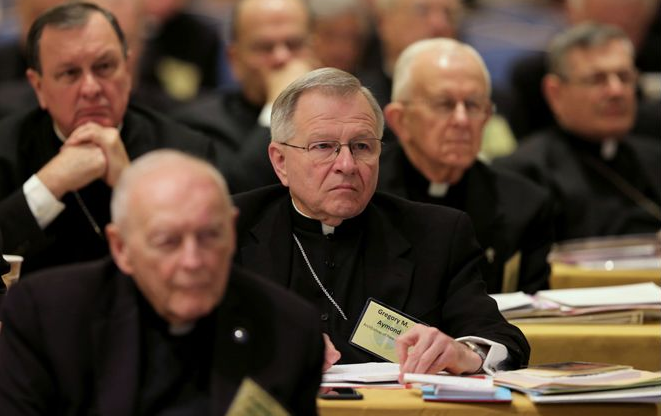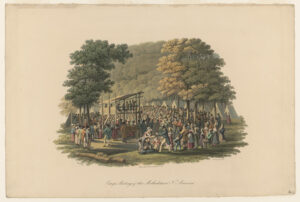An unassuming historical marker on Louisville’s 4th Street memorializes the spot where, in 1958, Thomas Merton had a revelation. In his 1966 book, Conjectures of a Guilty Bystander, he relates a profound experience; the feeling that he “loved all these people, that they were [his] and [he] theirs… that we could not be alien to one another even though we were total strangers.” It was the street corner’s mundanity that caused Merton to “redefine his monastic identity with greater involvement in social justice issues.” Over the next decade, he would become an icon of Catholic civil rights advocacy.
On the night of May 29, 2020, in that exact spot, protestors burned a Confederate flag over a Kentucky Bourbon barrel. These outraged residents of Louisville are confronting both the murder of George Floyd by Minneapolis police and the recent death of Breonna Taylor, a local woman killed by Louisville police during a botched no-knock warrant. The city has become a high mark in the nationwide uprisings that have spread in the week following Floyd’s death.
In contrast to Merton’s clarity of vision, the Roman Catholic Church is struggling with how to confront the latest episode of seeping racial and economic suffering at the core of American life. Hours before the flag burning, the U.S. Conference of Catholic Bishops (USCCB) released a statement praying for the repose of George Floyd’s soul, an end to violent protest, and their anticipation of “a full investigation that results in rightful accountability and actual justice.” If the protestors had read the message, they would find little hope for justice in it.
Many Catholics invest the Bishops with righteous authority and urgently desire that their shepherds affirm what their eyes and ears have already told them: that the murder of George Floyd was a moral evil facilitated by the structural sin of white supremacy. On the other hand, there is no shortage of police apologists amongst the Catholic donor class and within majority white parishes across the country. The Bishops are trying to find unity where unity is not possible and therefore must resort to vague and confusing phrase-mongering. Their public response reflects these divisions. On social media, American Catholics have admonished the USCCB explicitly use the word “murder” while others have demanded that the USCCB should stay silent about political matters.
The USCCB statement is at least an improvement on other bishops’ statements. With a vacuousness that would make even a heavily workshopped Pete Buttigieg press release seem bold, a statement by the Minnesota Catholic Conference weakly hedged by saying “if there was misconduct, hopefully justice will be done”. Bishop Rick Stika of Knoxville prayed specifically for the “good men and women of law enforcement,” and concluded with a mindboggingly tonedeaf “All Lives Matter.” The USCCB at least bothered to mention the “evil of racism” and presented Mr. Floyd’s death as “antithetical to the Gospel of Life.”
The hedging of the USCCB statement reflects the influence of darker reactionary elements that have cloaked themselves in the authority of Catholicism to influence U.S. politics and parishes. The Catholic broadcasting network, EWTN, has situated itself as a major pro-Trump media influencer. The Federalist Society’s Leonard Leo has used conservative Catholic networks to reshape the U.S. Supreme Court. Millions of dollars flow through organizations like Fidelis’s CatholicVote project to target specific parishes for the re-election campaign of Donald Trump in the Midwest. Abby Johnson, the Catholic activist and subject of the anti-abortion film Unplanned, speculated that the George Lloyd’s death was not an issue of racism. It is surprising that Johnson has a platform at all after her racist rant calling Protestant Bishop Talbert Swan a “Tyrone” and a “thug.”
At the fringes of the extreme right, personalities like far right activist Kaitlin Bennett have cloaked their crypto-fascism in a bizarre call for Catholic monarchy. American oligarchs, such as the Busch family are funnelling massive amounts of money to influence the American Church through political organizations and educational institutions. The accumulation of profit is foundational to capitalism, so the rich will always side with “law and order” politics, as it serves to stabilize the flow of capital — even at the expense of human life. The financial influence and interests of the rich will always subordinate issues of justice to the judgement of the American capitalist class rather than the judgement of Church teaching.
Rather than timidity in the face of the American Right, St. John Paul II affirmed that the Bishop has a specific obligation as a prophet of justice to “rais[e] his voice on behalf of the voiceless in order to defend their rights.” The defense of human rights is not a matter of an easy, false unity but the championship of the poor in the “war of the powerful against the weak [that]… has created profound divisions between rich and poor.” The Minnesota Catholic Conference will defy the law to re-open churches during a pandemic and priests will get arrested protesting abortion, but on matters of racist violence they have become suddenly more cautious.
As Gustavo Gutiérrez, OP wrote in A Theology of Liberation, when it comes to struggle against oppression, the Church’s attempt to “piously cover over this social division with a fictitious and formalistic unity is to avoid a difficult and conflictual reality and definitely join the dominant class.” Caution is dangerous for the victims of racist violence, many of whom are members of the very body that professes the Church’s unity through visible bonds of charity. The moral clarity of the Church has both pastoral and evangelical importance in these dire and divided times and it often feels as though the USCCB prefers the safety of indistinction and obfuscation.
In a time of crisis, Thomas Merton used his voice to name injustice, calling the Vietnam War “an overwhelming atrocity” and upheld Malcolm X as “a fighter whose sincerity and courage we cannot help admiring.” The contrast of Merton’s moral clarity and activism to that of the USCCB may explain why he has never been well-received by them. While his writing is popular among Catholic lay people, his prophetic style has not found a place in the bishop’s evangelical efforts. The USCCB has even gone so far as to remove references to his work from catechetical materials.
Nevertheless, Merton found a more important patron than the USCCB. When Pope Francis visited the United States in 2015 he chose to celebrate both Merton and activist Dorothy Day as two viritous Catholics who “offer us a way of seeing and interpreting reality.” It is a time for American Catholics to embrace the legacy of activism that Pope Francis has directed us toward. One would hope that the USCCB could inspire protests that are hungry for justice, that boldly confront oppression, and that lead us to repentance.
Jefferson Hodge is a Roman Catholic and member of Democratic Socialists of America. He lives in East Tennessee with his wife and son.




